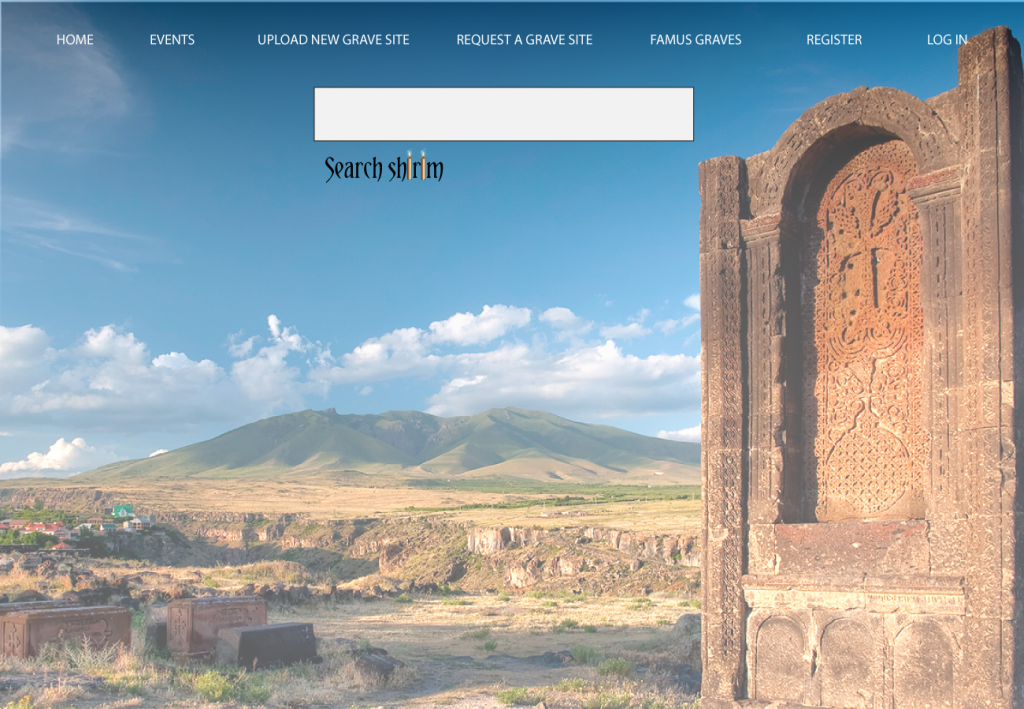“It is a Facebook of corpses,” so reacted my interlocutor when I asked him whether he is familiar with hush.am and shirim.am websites that offer people an opportunity to seek and find the graves of their passed away relatives and virtually “visit” their graves. They also offer services: grave care, delivery of flowers and so on. Another interlocutor, learning about the existence of such sites, said, “There is someone that I would like to see whether he is dead or not.” The creator of hush.am site, Doctor of Astrophysics at the Oxford University, Mihran Vardanyan, tells that the idea of developing such a website arose during the years of his study abroad when he often met with Armenians who could not find the graves of their relatives. “I developed a website to present information about the ancestors of all Armenians. We have digitalized more than one million graves. The website is updated on regular basis, we are planning to take photos of the graves once more time every year.”
In addition to the graves of Armenia, the site includes also the Armenians graves in other countries. “As you know, the traces and contributions are systematically tried to be erased in various countries. For example, the Jugha cemetery is completely destroyed, no single trace has been left, there were more than 1000 Armenians in the Khojavank cemetery – mostly eminent people and politicians, and now, about 50 tombstones are left in its place. Now, the Syrian Armenian cultural centers are at stake. Our site enables to preserve the heritage of Armenians for the future generations.”
Priest from the Surp Zoravor Astvatsatsin Church, Ter-Grigoryan opines that with the same success, a person can insert the photo of his dead relative into the screen of the computer and look at it for hours. “Instead of visiting such sites, we should daily pray for the peace of the souls of our dead.” Contrary to this viewpoint, a priest from the St. Hovhannes Church, Shmavon Ghevondyan, appreciates the titanic work of the creators of the website and does not see any negative aspect. Psychologist Anna Badalyan said that these sites carry a dual effect: negative and positive. It is positive because it carries a memory of sorrow and suffering in it, the positive is that the person is prepared to clash of the above-mentioned psychological problems. Here, it becomes priority about how the person uses the website. If he is matured and established, then it is normal, it will have a dynamic psychological impact, if not – a negative and again full of internal anxieties.
Psychologist Sona Manusyan, referring to the services delivered by the website, said, “Some elements and ideas of the site are clear, useful and civilized, for example, distance ordering of the care that can help a lot of people living abroad, while other elements are unusual and immature, calculated on the mentality of philistine, even ridiculous, for instances, delivery of flowers. What comes to the basic psychological impact, it would be an exaggeration to discuss it seriously here, because the loss of a relative, even though it is psychologically traumatic, the person, one way or another, takes it with heavy heart and there are many other things around him reminding about it: the belongings of the relative, the photos, and the memoirs. Hardly, the website can make it heavier since the person is associated not with the gravestone to see and get excited but with the live images and photos. The site is not built the way to create a psychological dependence, it does not have anything other than the photo of the tomb reminding about the dead, it is technical and unattractive in terms of visual.”
Read also
We were curious to know from Mihran Vardanyan about how he interprets the meaning of the service – delivery of flowers. “Delivery of flowers to the tomb of the dead is a kind of tribute. In some countries, it is accepted to grow flowers on the graves, but, unfortunately, our dry and hot climate does not enable it. Also, a systemic irrigation system is missing.” In his speech, the site creator also highlighted the fact that for the implementation of these services, they hire people who have no education, are unemployed and have no opportunity to earn their daily bread doing another job.
To our question of whether the website will result in the fact that people would “visit” the cemetery only virtually, psychologist Sona Manusyan replied, “I think this will not particularly affect the true visits. People’s fears about being cut off the reality are often exaggerated. The virtual element has been added to many aspects of our lives, for example, we communicate virtually, people are talking from country to country via Skype, it is also a positive achievement and definitely does not lead to robotics.” Psychologist Anna Badalyan added, “The website is the next virtual attack to the emotions and feelings, to the human communication and interaction.
Liliana OSIPYAN























































